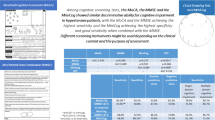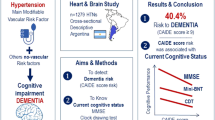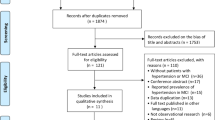Abstract
To treat older patients with hypertension, it is important to detect cognitive impairment at an early stage because of its potential influence on treatment efficacy and functional prognosis. In this study, we aimed to identify the incidence and determinants of cognitive impairment in hypertensive patients aged 65 years and above who visited our outpatient clinic and were not previously diagnosed with cognitive impairment. Among 312 patients with hypertension, we found that 35% (n = 109) and 7.7% (n = 24) had cognitive impairment and dementia, respectively, as defined by the Mini-Mental State Examination (≤27 or ≤23, respectively). Patients with cognitive impairment were older, had lower levels of education, and had lower instrumental activities of daily living (IADL) scores than those without cognitive impairment. Multiple regression analysis revealed that age and IADL were associated with cognitive impairment in patients with hypertension. Regarding the treatment of hypertension, the office and home blood pressure levels, number of antihypertensive medications prescribed, and proportion of the use of each antihypertensive drug was equivalent between patients with and without cognitive impairment. Finally, patients with unrecognized cognitive impairment showed distinct clinical characteristics, including high antihypertensive medication burden and preserved IADL, when compared to hypertensive patients in the different cohorts of definitive mild cognitive impairment of a similar age. These findings suggest that older hypertensive patients are at a high risk of masked cognitive decline, even if they are functionally independent.
This is a preview of subscription content, access via your institution
Access options
Subscribe to this journal
Receive 12 print issues and online access
$259.00 per year
only $21.58 per issue
Buy this article
- Purchase on Springer Link
- Instant access to full article PDF
Prices may be subject to local taxes which are calculated during checkout
Similar content being viewed by others
References
Hudani ZK, Rojas-Fernandez CH. A scoping review on medication adherence in older patients with cognitive impairment or dementia. Res Soc Adm Pharm. 2016;12:815–29.
Yamazaki Y, Miwa T, Sakurai H, Hanyu H, Iwamoto T, Odawara M. Clinical backgrounds and morbidity of cognitive impairment in elderly diabetic patients. Endocr J. 2011;58:109–15.
Murata Y, Kadoya Y, Yamada S, Sanke T. Cognitive impairment in elderly patients with type 2 diabetes mellitus: prevalence and related clinical factors. Diabetol Int. 2017;8:193–8.
Kume Y, Takahashi T, Itakura Y, Lee S, Makizako H, Ono T, et al. Characteristics of Mild Cognitive Impairment in Northern Japanese Community-Dwellers from the ORANGE Registry. J Clin Med. 2019;8:1937.
Saji N, Sakurai T, Suzuki K, Mizusawa H, Toba K, investigators O. ORANGE’s challenge: developing wide-ranging dementia research in Japan. Lancet Neurol. 2016;15:661–2.
Umemura S, Arima H, Arima S, Asayama K, Dohi Y, Hirooka Y, et al. The Japanese Society of Hypertension Guidelines for the Management of Hypertension (JSH 2019). Hypertens Res. 2019;42:1235–481.
Chen LK, Woo J, Assantachai P, Auyeung TW, Chou MY, Iijima K, et al. Asian Working Group for Sarcopenia: 2019 consensus update on sarcopenia diagnosis and treatment. J Am Med Dir Assoc. 2020;21:300–7. e302
O’Bryant SE, Humphreys JD, Smith GE, Ivnik RJ, Graff-Radford NR, Petersen RC, et al. Detecting dementia with the mini-mental state examination in highly educated individuals. Arch Neurol. 2008;65:963–7.
Tsoi KK, Chan JY, Hirai HW, Wong SY, Kwok TC. Cognitive tests to detect dementia: a systematic review and meta-analysis. JAMA Intern Med. 2015;175:1450–8.
Lesher EL, Berryhill JS. Validation of the Geriatric Depression Scale-Short Form among inpatients. J Clin Psychol. 1994;50:256–60.
Mahoney FI, Barthel DW. Functional evaluation: the Barthel Index. Md State Med J. 1965;14:61–65.
Satake S, Arai H. The revised Japanese version of the Cardiovascular Health Study criteria (revised J-CHS criteria). Geriatr Gerontol Int. 2020;20:992–3.
Lawton MP, Brody EM. Assessment of older people: self-maintaining and instrumental activities of daily living. Gerontologist. 1969;9:179–86.
Concato J, Feinstein AR, Holford TR. The risk of determining risk with multivariable models. Ann Intern Med. 1993;118:201–10.
Xiu S, Zheng Z, Liao Q, Chan P. Different risk factors for cognitive impairment among community-dwelling elderly, with impaired fasting glucose or diabetes. Diabetes Metab Syndr Obes. 2019;12:121–30.
Cho MH, Shin DW, Chang SA, Lee JE, Jeong SM, Kim SH, et al. Association between cognitive impairment and poor antihypertensive medication adherence in elderly hypertensive patients without dementia. Sci Rep. 2018;8:11688.
Livingston G, Sommerlad A, Orgeta V, Costafreda SG, Huntley J, Ames D, et al. Dementia prevention, intervention, and care. Lancet. 2017;390:2673–734.
Haley WE, Gilbert ON, Riley RF, Newman JC, Roumie CL, Whittle J, et al. The association between Self-Reported Medication Adherence scores and systolic blood pressure control: a SPRINT baseline data study. J Am Soc Hypertens. 2016;10:857–64. e852
Muntner P, Levitan EB, Joyce C, Holt E, Mann D, Oparil S, et al. Association between antihypertensive medication adherence and visit-to-visit variability of blood pressure. J Clin Hypertens. 2013;15:112–7.
Kronish IM, Lynch AI, Oparil S, Whittle J, Davis BR, Simpson LM, et al. The association between antihypertensive medication nonadherence and visit-to-visit variability of blood pressure: findings from the antihypertensive and lipid-lowering treatment to prevent heart attack trial. Hypertension. 2016;68:39–45.
Dillon P, Smith SM, Gallagher PJ, Cousins G. Association between gaps in antihypertensive medication adherence and injurious falls in older community-dwelling adults: a prospective cohort study. BMJ Open. 2019;9:e022927.
Qiu C, von Strauss E, Winblad B, Fratiglioni L. Decline in blood pressure over time and risk of dementia: a longitudinal study from the Kungsholmen project. Stroke. 2004;35:1810–5.
Pinto TCC, Machado L, Bulgacov TM, Rodrigues-Junior AL, Costa MLG, Ximenes RCC, et al. Is the Montreal Cognitive Assessment (MoCA) screening superior to the Mini-Mental State Examination (MMSE) in the detection of mild cognitive impairment (MCI) and Alzheimer’s Disease (AD) in the elderly? Int Psychogeriatr. 2019;31:491–504.
Koepsell TD, Monsell SE. Reversion from mild cognitive impairment to normal or near-normal cognition: risk factors and prognosis. Neurology. 2012;79:1591–8.
Dementia warning for the Asia-Pacific region. Lancet Neurol. 2015;14:1.
Acknowledgements
We are very grateful to Eriko Kimura for her excellent secretarial assistance.
Funding
This work was supported by The Research Funding for Longevity Sciences (30-8) from the National Center for Geriatrics and Gerontology (NCGG), Japan.
Author information
Authors and Affiliations
Consortia
Corresponding authors
Ethics declarations
Conflict of interest
The authors declare no competing interests.
Additional information
Publisher’s note Springer Nature remains neutral with regard to jurisdictional claims in published maps and institutional affiliations.
Rights and permissions
About this article
Cite this article
Yamamoto, K., Akasaka, H., Yasunobe, Y. et al. Clinical characteristics of older adults with hypertension and unrecognized cognitive impairment. Hypertens Res 45, 612–619 (2022). https://doi.org/10.1038/s41440-022-00861-z
Received:
Revised:
Accepted:
Published:
Issue Date:
DOI: https://doi.org/10.1038/s41440-022-00861-z
Keywords
This article is cited by
-
2023 update and perspectives
Hypertension Research (2024)
-
The relationship between changes in exercise habits and psychosomatic activities in older hypertensive patients during the COVID-19 pandemic
Hypertension Research (2023)
-
Impact of the COVID-19 pandemic on physical and psychological activities in elderly patients with hypertension
Hypertension Research (2023)
-
Hypertensive and cognitive function: did we come to a dead end?
Hypertension Research (2022)
-
Is unrecognized cognitive impairment in hypertension unmasked by diabetes mellitus?
Hypertension Research (2022)



